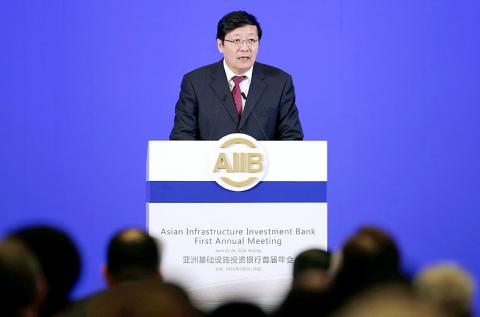Chinese Minister of Finance Lou Jiwei (樓繼偉) yesterday voiced concerns about Britain’s vote to leave the EU, with the policymaker saying it has heightened market uncertainty, although some analysts expect a limited impact on the Chinese economy.
The “Brexit” decision “will cast a shadow over the global economy... The repercussions and fallout will emerge in the next five to 10 years,” Lou said at the first annual meeting of the Asian Infrastructure Investment Bank in Beijing.
“It’s difficult to predict now,” he said. “The knee-jerk reaction from the market is probably a bit excessive and needs to calm down and take an objective view.”

Photo: Reuters
Stock markets around the world plunged in the wake of the referendum while the pound also plummeted.
Lou’s views were separately echoed by other economists at the World Economic Forum (WEF) in China’s northern city of Tianjin.
“It’s hard to talk about and judge the direct impact on China’s economy,” said Huang Yiping (黃益平), a professor at Peking University and a member of the central bank’s monetary policy committee.
“If [Brexit] is an important landmark in terms of a reversal of globalization, I think that’s very bad for the world, it’s very bad for China,” Huang said.
Tsinghua University professor Li Daokui (李稻葵) was more optimistic on the referendum’s effects on the world’s second-largest economy.
“China is perhaps one of the least impacted economies in the world by the event of Brexit,” he told an audience at the WEF. “The only short-term impact I can think about is the exchange rate of the renminbi [yuan]... But I do think within a few trading sessions that situation will very quickly subdued.”
Also speaking at the forum was economist Nouriel Roubini, famed for predicting the global financial crisis, who said the decision to leave the EU “creates a whole bunch of financial, economic, political and geopolitical uncertainties.”
It could be the “beginning of the disintegration” of the bloc of countries, the euro zone or the UK, Roubini said.
“I don’t expect a global recession or another global financial crisis,” he added. “I think the impact of Brexit is significant but not of the same size and magnitude of the one we had 2007 to 2009.”
JP Morgan global investment management Asia Pacific CEO Michael Falcon said he expects more market volatility but does not think the vote would derail a global recovery.
“It is a shock, not a crisis and so far markets seem to be handling this pretty well,” Falcon said at the WEF.

CHIP RACE: Three years of overbroad export controls drove foreign competitors to pursue their own AI chips, and ‘cost US taxpayers billions of dollars,’ Nvidia said China has figured out the US strategy for allowing it to buy Nvidia Corp’s H200s and is rejecting the artificial intelligence (AI) chip in favor of domestically developed semiconductors, White House AI adviser David Sacks said, citing news reports. US President Donald Trump on Monday said that he would allow shipments of Nvidia’s H200 chips to China, part of an administration effort backed by Sacks to challenge Chinese tech champions such as Huawei Technologies Co (華為) by bringing US competition to their home market. On Friday, Sacks signaled that he was uncertain about whether that approach would work. “They’re rejecting our chips,” Sacks

Taiwan’s long-term economic competitiveness will hinge not only on national champions like Taiwan Semiconductor Manufacturing Co. (TSMC, 台積電) but also on the widespread adoption of artificial intelligence (AI) and other emerging technologies, a US-based scholar has said. At a lecture in Taipei on Tuesday, Jeffrey Ding, assistant professor of political science at the George Washington University and author of "Technology and the Rise of Great Powers," argued that historical experience shows that general-purpose technologies (GPTs) — such as electricity, computers and now AI — shape long-term economic advantages through their diffusion across the broader economy. "What really matters is not who pioneers

In a high-security Shenzhen laboratory, Chinese scientists have built what Washington has spent years trying to prevent: a prototype of a machine capable of producing the cutting-edge semiconductor chips that power artificial intelligence (AI), smartphones and weapons central to Western military dominance, Reuters has learned. Completed early this year and undergoing testing, the prototype fills nearly an entire factory floor. It was built by a team of former engineers from Dutch semiconductor giant ASML who reverse-engineered the company’s extreme ultraviolet lithography (EUV) machines, according to two people with knowledge of the project. EUV machines sit at the heart of a technological Cold

TAIWAN VALUE CHAIN: Foxtron is to fully own Luxgen following the transaction and it plans to launch a new electric model, the Foxtron Bria, in Taiwan next year Yulon Motor Co (裕隆汽車) yesterday said that its board of directors approved the disposal of its electric vehicle (EV) unit, Luxgen Motor Co (納智捷汽車), to Foxtron Vehicle Technologies Co (鴻華先進) for NT$787.6 million (US$24.98 million). Foxtron, a half-half joint venture between Yulon affiliate Hua-Chuang Automobile Information Technical Center Co (華創車電) and Hon Hai Precision Industry Co (鴻海精密), expects to wrap up the deal in the first quarter of next year. Foxtron would fully own Luxgen following the transaction, including five car distributing companies, outlets and all employees. The deal is subject to the approval of the Fair Trade Commission, Foxtron said. “Foxtron will be